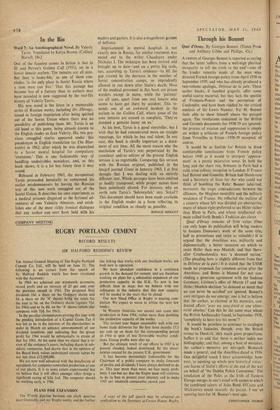Through his Bonnet
A FRIEND of Georges Bonnet is reported as saying that the latter 'suffers from a well-nigh physical incapacity to tell the truth to the end'—one of the kinder remarks made of the man who directed French foreign policy from April 1938 to September 1939, and who has already produced a two-volume apologia, Defense de la paix. These earlier books, if handled gingerly, offer some useful source material, but they lack the sparkle of Francois-Poncet and the perception of Coulondre, and have been riddled by the critical analysis of Sir Lewis Namier. Yet M. Bonnet feels able to show himself above the parapet again. The revelations contained in the British and German documents for 1938-39 are ignored; the process of evasion and suppression is simply set within a criticism of French foreign policy from Versailles to Evian-1938-39 excepted, of course.
It would be as foolish for Britain to draw comfortable conclusions from French policy before 1940 as it would to interpret 'appease- ment' in a purely pejorative sense. In both the long and the short run, firmness in Paris had a cold, even callous, reception in London. If France had Bonnet and Gamelin, Britain had Henderson and a Secretary of State for Air who could not think of bombing the Ruhr. Bonnet inherited, moreover, the tragic contradictions between the alliances, the Maginot mentality and the military weakness of France. He reflected the malaise of a country whose left was divided yet obstructive, many of whose right preferred to see Hitler rather than Blum in Paris, and whose intellectual cli- mate called forth Benda's Trahison des clercs.
Quai d'Orsay remains of little value. (One can only hope its publication will bring readers to Jacques Dumaine's work of the same title, half as pretentious and twice as valuable.) It is argued that the Anschluss was, militarily and diplomatically, a better occasion on which to resist Hitler than was Munich, and that there- after Czechoslovakia was 'a doomed nation.' (The pleading here is slightly different from that in Defense de la paix.) It is stated that the USSR made no proposals for common action after the Ansch/uss, and Benes is blamed for not con- cluding a generous agreement with the Sudeten Germans; Litvinov's offer of March 17 and the Hitler/ Henlein decision 'to demand so much that we can never be satisfied' are ignored. Bonnet's own intrigues do not emerge; one is led to believe that the author, as claimed in his memoirs, con- ducted affairs 'avec un sang-froid et tine °Nee- tivite absolus.' Can this be the same man whom the British Ambassador found, in September 1938, 'completely to have lost his nerve'?
It would be pointless to continue to catalogue the book's fantasies, though, over the British retreat to Dunkirk, they reach gross proportions. Suffice it to add that there is neither index nor bibliography, and that, among a host of mistakes, the author's memoirs are mis-spelt, Bismarck made a general, and the A nschluss dated in 1936. One delightful touch I must acknowledge, how- ever, as opening up whole new historical vistas : one learns of Stalin's efforts at the end of the war on behalf of the Dublin Polish Committee.' The revelation of the Poles as the Irish of Eastern Europe merges in one's mind with scenes to which the combined talents of John Reed. O'Casey and Mickiewicz could scarcely do justice. I see an opening here for M. Bonnet's next epic.
CHRISTOPHER THORNE






























 Previous page
Previous page